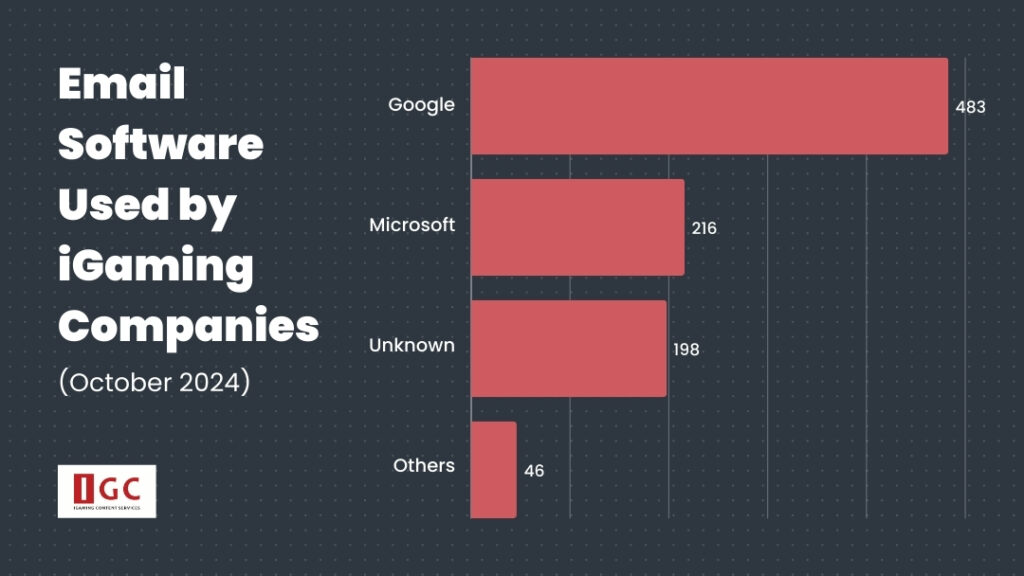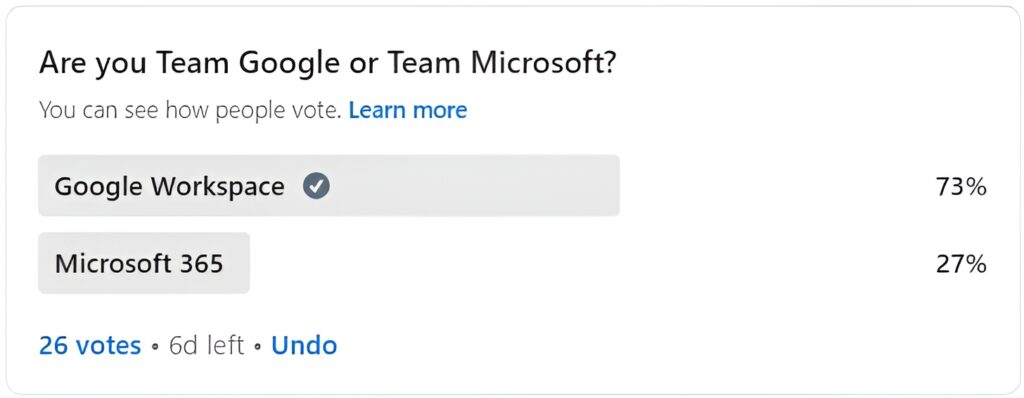We are in the era of cloud-based productivity, and regardless of where you work, technology plays a crucial role in enabling collaboration and project management.
In the land of productivity platforms and tools, Google Workspace (Google Docs/Sheets/Gmail) and Microsoft 365 (Word/Excel/Outlook) wear the crown. Together, they hold 96% of the office productivity software market share, with Google Workspace accounting for over 50%.
The iGaming industry is generally quite forward-thinking, and most companies are at least partially remote working. Therefore, our hypothesis when starting this piece was that Google Workspace would have more users in the iGaming space than Microsoft 365. But we needed some solid evidence to back that up.
We made the decision a few years ago to use Google Workspace as our productivity suite within IGC, and haven’t looked back since then. But as an agency, we collaborate with our clients and our language specialists on a daily basis to deliver content, translations, and publications - and the tools used to order, complete and deliver that work are undeniably relevant.
Everyone has their own preferences and biases when it comes to this. Even within IGC, not everyone is a dyed-in-the-wool Google Workspace evangelist (far from it). So, we decided it was time to challenge our own assumptions and see whether we are, indeed, in the majority.
We analysed the domains of around 1,000 iGaming or iGaming-adjacent companies from our internal database using MXToolBox to check whether they are using Outlook or Gmail for their email service.
Our assumption is that if a company uses Gmail, it is likely to also use Google Workspace products such as Google Docs and Google Sheets, since they all exist within the same ecosystem and are bundled together in the pricing. Whereas a company that uses Outlook will most probably use Microsoft Word and Microsoft Excel, for the same reasons.

Our findings reveal that more than half of the domains we analysed (51.6 %) seem to be using Google Workspace, while Microsoft 365 only constitutes less than half of that at 23.1%.
At this point, we should mention that the data we are basing this on is by no means perfect. Some of the domains we checked might be no longer active, we are relying on a third-party tool to check their DNS records, and our assumption that email provider and productivity software will be the same may be incorrect in some cases. However, for the purposes of this article, we felt the data is sufficient.
That being said, we didn’t want to draw a conclusion based on our research alone. We took a step further and asked our LinkedIn community which tool set they are using for their business, and the result does not stray far from our findings.
Google Workspace, once again, seems to be the crowd favourite.

So, how do these productivity heavyweights actually compare in terms of what they offer users? Here's a quick summary.
Collaboration: You can easily view your teammates editing and reviewing documents in real time.
Usability: Its simple and straightforward interface, with more complex functionality hidden just below the surface, ensures broad appeal.
Web-based: It works the same for anyone with a web browser and an Internet connection, regardless of the device’s operating system.
Compatibility: Google Docs can open and edit Word documents, Google Sheets can work with Excel sheets, and so on.
Functionality: Microsoft products are known for being able to handle complex actions and functions. Excel in particular, is able to handle very large datasets and offers more in the way of accountancy functions.
Ubiquitous and Familiar: Microsoft Office has been around since 1990, so the software is indelibly associated with productivity, and people are generally more familiar with it.
Superior Brand Perception: Microsoft tools and services are often used by large corporations and educational organisations, which contribute largely to its premium facade in the eyes of consumers.
Collaboration and Web Apps: In recent years, Microsoft’s offering has been improving its real-time collaboration and web applications to try and eliminate Google’s perceived advantage in these respects.
All in all, both options have their “suite” spots (pun intended). Google Workspace is an accessible all-rounder, ideal for real-time collaboration, whereas Microsoft 365 is favoured by more traditional companies seeking familiarity and certain advanced functionality.
At IGC, we seek to work seamlessly with our clients regardless of the tools and platforms and can deliver work in almost any format you choose. Get in touch or book a call, and let us know what you need.